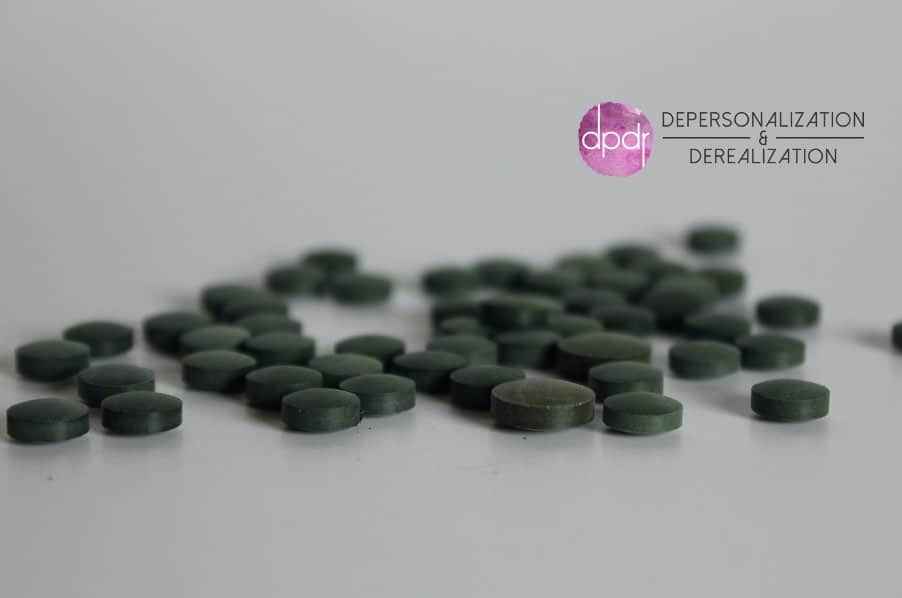I took chlorella during my depersonalization recovery, since it’s said to decrease the toxicity in your body, and I strongly believe, increased toxicity levels can play a vital role in your DPDR disorder. Today I’m 100% cured.
What is Chlorella?
Chlorella or blue-green algae is a supplement that is known to reduce weight, fights cancer, increase anti-bodies, and much more.
It is an alga that grows in freshwater and is actively used in several supplements. It contains many nutrients. However, chlorella is hard to digest in its natural form, which is why it needs to be processed.
Effects of Chlorella on the Mind and Body
Pros: Chlorella helps in improving cholesterol levels, strengthen the immune system, manage respiratory diseases, and control the sugar levels, just to name a few.
Cons: On the other hand, a person that uses chlorella may also witness some side-effects. For instance, green color in stool, diarrhea, nausea, stomach cramping or gas. Furthermore, it often makes the skin very sensitive to the sun, which can result in agitations.
How Does Chlorella Work?
Chlorella is enriched with vitamins, fats, carbohydrates, chlorophyll, minerals, and fiber. Chlorella contains anti-oxidant properties that reduce oxidative stress, which can help in reducing mental illness sysmptoms..
Research Studies of Chlorella and Mental Illness
According to a study conducted by Nakashima et al. (2009), chlorella shows potential in reducing age-related mental health issues. Oxidative stress is the leading cause of age-related mental health issues. Since chlorella contains anti-oxidants in it, oxidative stress is reduced in the body.
Chlorella reduces cognitive impairment if taken regularly with diet, as per the same study. In short, the anti-oxidant property of chlorella is what accounts for a reduction in mental illness symptoms.
There is not much evidence to comment on the viability of the chlorella use. The side-effects and benefits of chlorella are many, but more research is required to comment on it.
Did Chlorella Help Me Get Through DPDR?
I really can’t say. I didn’t have an immidiate noticeable reaction, as I did with the supplement Enterosgel or through a cleanse. I didn’t have a negative reaction either, thus it’s up to you, if you want to give it a try.
Conclusion
The control of oxidative stress leads to a decline in mental illness in a person. Since chlorella contains anti-oxidants in it, it leads to reducing the oxidative stress in the body. Thus chlorella is beneficial for your physiology and mental state. Although there is limited research on the direct relationship between chlorella and mental health, the nutrients in the supplement show good results. It is suggested to contact your physician before starting the supplement, if you’re suffering from a disease.
Don’t give up! Thousands have had DPDR, and thousands have also beaten DPDR! You’ll get through it!
Related Questions
Can Omega-3 Cure Depersonalization? A main cause of depersonalization derealization disorder are high anxiety levels. The sample size, in Lara Nataccis 2018 study on the effect of Omega 3 fatty acids and anxiety disorders [1], consisted of 12.268 adults. The study showed that with higher omega 3 intake as well as lower omega 6 / omega 3 ratios, the likelihood of an adult having an anxiety disorder decreased.
Want to find out how Omega-3 effects depersonalization? Check out the following post –> Can Omega-3 Cure Depersonalization (DPDR)
Does therapy cure depersonalisation? The day I got out of depersonalisation was after a day of therapy, so yes, therapy can accelerate recovery! Here are the 4 best therapies backed by scientific research and or my own experiences:
- Psychodynamic therapy
- Cognitive-behavioural therapy
- Acceptance and commitment therapy
- Integrated manual therapy
Want to learn more about the different types of therapy options then feel free to click the link –> Does Therapy Cure Depersonalization
References
Yuya Nakashima, Preventive effects of Chlorella on cognitive decline in age-dependent dementia model mice, Neuroscience Letters, Volume 464, Issue 3, 2009, Pages 193-198, https://www.sciencedirect.com/science/article/abs/pii/S0304394009011367?via%3Dihub

